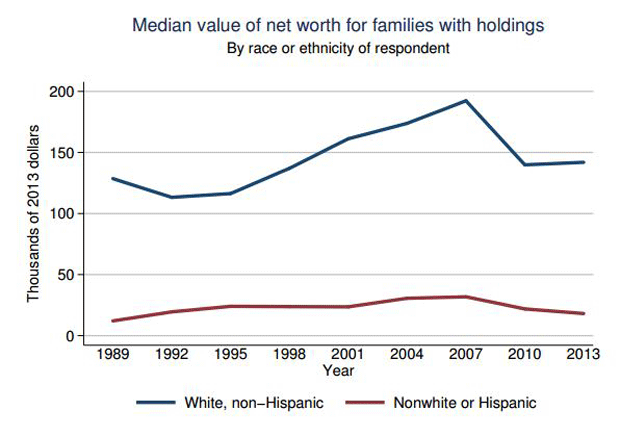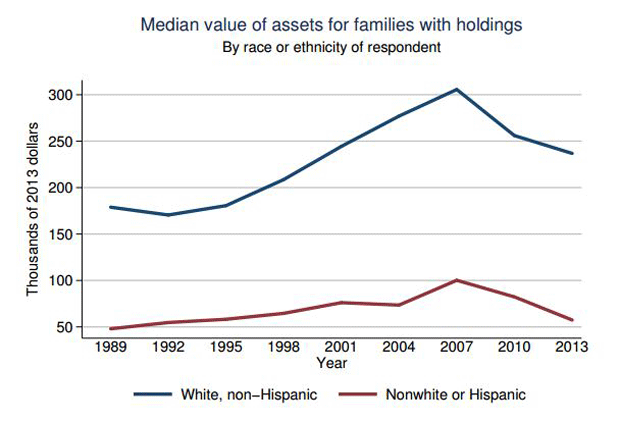How long will it take black families to catch up with white wealth?
When it comes to wealth accumulation, the economy is anything but color blind.
The racial wealth gap has widened dramatically since the 1980s, leaving black and Latino families far behind the asset accumulation enjoyed by the typical white family, according to a study from the Corporation for Enterprise Development, a nonprofit group focused on improving economic opportunity for low-income people, and the Institute for Policy Studies, a left-leaning think tank.
Black families would need 228 years to accumulate the same amount of wealth that white families enjoy today, according to the report, which relies on 30 years of net worth data from the Federal Reserve's Survey of Consumer Finances.
Wealth, while not as frequently cited as income when studying the financial health of American families, nevertheless is an important indicator of economic well-being. It helps families weather tough spots, save up for retirement and childrens' college education, or buy a home. The widening disparity between whites, blacks and Hispanics poses not only problems for individuals on the losing end of the economic trend, but for the American economy as a whole.
No surprise, then, that the racial wealth divide has drawn the attention of Federal Reserve Chair Janet Yellen, who in June called the trend "extremely disturbing."
"Our vision for racial equity will be impossible to achieve if we continue perpetuating an economic system that fails to prioritize the ability of households of color to get by, much less ahead," the report's authors said. "In the absence of significant reforms to large-scale public policies that currently exacerbate racial and economic inequality, closing the racial wealth divide will not happen anytime soon."
The report adds, "This is especially concerning as we're less than one generation away from becoming a majority-minority nation."
The findings come on the heels of a new economic platform from Black Lives Matter, aimed at addressing wealth and income disparities between the races. The activist movement is pushing for issues such as a progressive tax codes and greater worker protections, as well as reparations for slavery and current and past discrimination, among other policies.
The average white family in 2013 had household wealth of $656,000, compared with $85,000 for blacks and $98,000 for Hispanics. In 1983, whites had about $355,000 in wealth, compared with $67,000 for blacks and $58,000 for Hispanics.
By 2043, when demographers expect a plurality of Americans to be people of color, the wealth divide is projected to double from about $500,000 in 2013 to more than $1 million.
"If average black family wealth continues to grow at the same pace it has over the past three decades, it would take black families 228 years to amass the same amount of wealth white families have today," the report says. "That's just 17 years shorter than the 245-year span of slavery in this country."
The analysis points to a series of systemic issues that have exacerbated the wealth gap during the past three decades, such as what it describes as discriminatory housing policies and the increased risk that blacks and Hispanics will turn to expensive financial products such as check cashers and prepaid cards if they lack the financial wherewithal to turn to traditional financial services.
While all of those issues are problematic, the wealth gap may be exacerbated by the "rich get richer" economy that's buoyed the fortunes of the top 1 percent of America's earners while leaving much of the country behind. Wealth enables people to invest in the stock market and buy real estate, which is the type of capital accumulation that allows the rich to get even richer.
The argument from economist Thomas Piketty, in his "Capital in the Twenty-First Century," is that the rate of return on capital outpaces that of economic growth. That means wage slaves can't get ahead, leading to ever widening gaps between the rich and everyone else.
At the same time, the income gap between black and whites has also grown wider, according to a recent study from the Pew Research Center. It found that white household annual income exceeds that of black households by $28,000, compared with a gap of $20,000 in 1967.
For blacks and Hispanics to reach the same level of wealth as whites, "an enormous amount of attention and investment" will be required, the IPS report noted. It recommends a number of strategies from undertaking a government-wide audit on federal policies to tweaking the tax code to help low-wealth families, such as expanding the earned income tax credit.

